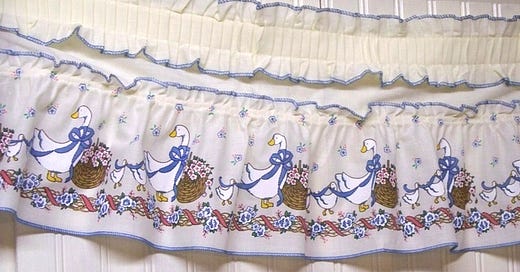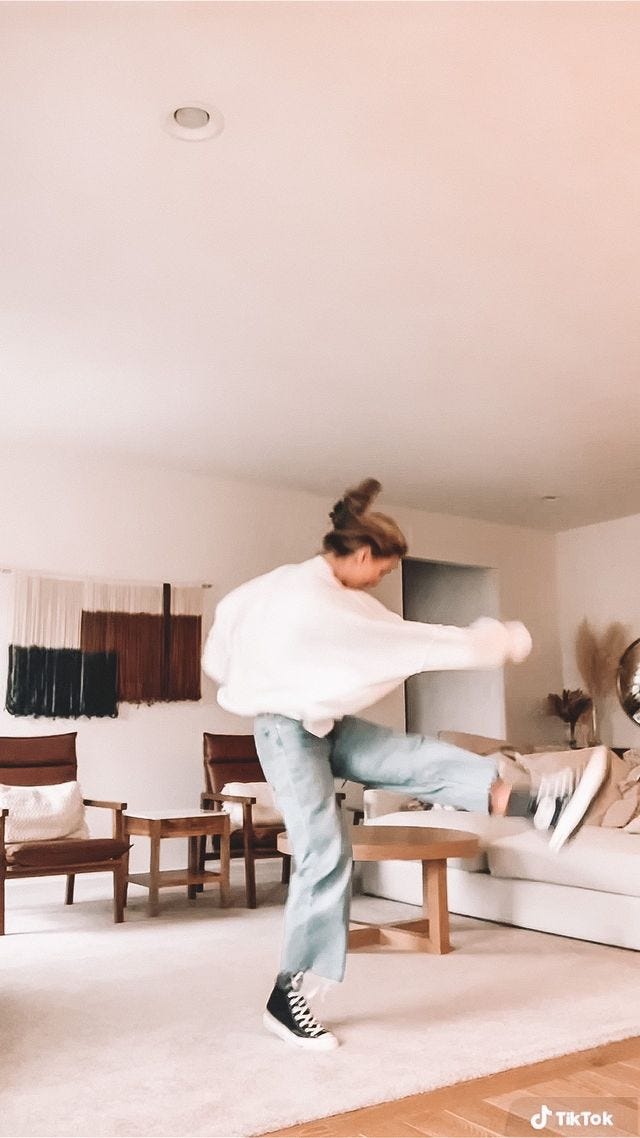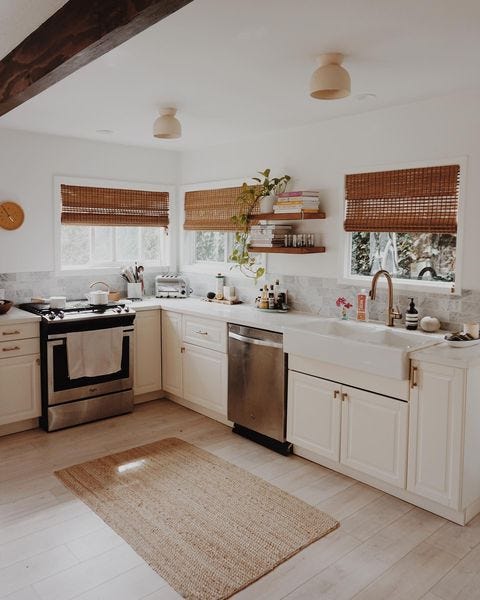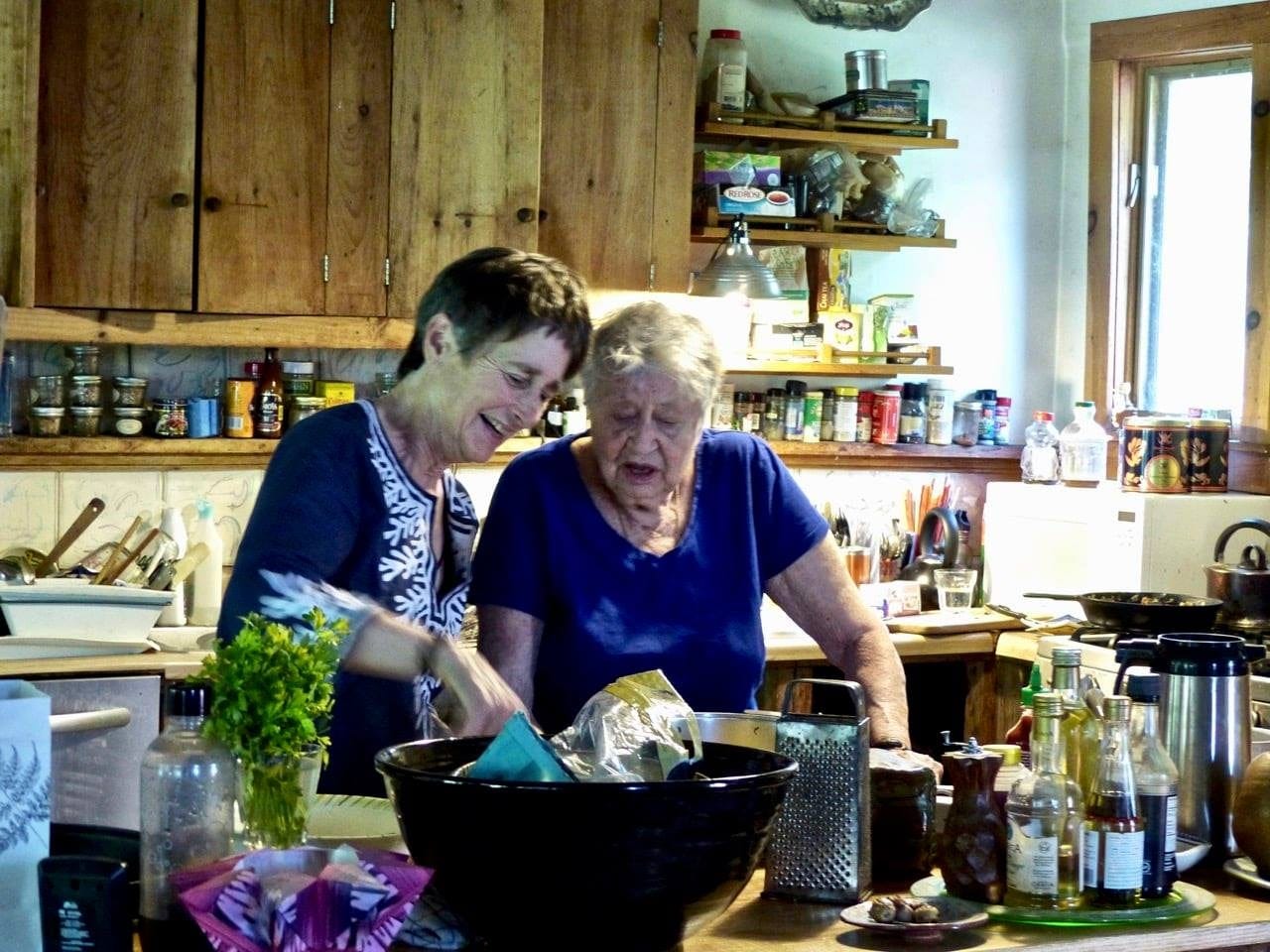If you enjoy Mothers Under the Influence, you can receive two editions a month instead of one as a paid subscriber!
The most recent paid post was We Tell Ourselves Stories In Order to Live/Laugh/Love.
Much like how refined men of the 80s read Playboy “for the articles,” I follow most momfluencers “for the interiors.” And, yes, for the complex social and algorithmic entanglements etc etc, but mostly, on an intimate, what-spikes-my-blood-pressure level, it’s the houses. And their insides.
Even as a kid I sensed that housekeeping was vaguely ideological. In fifth grade, while I was living with my dad on his commune in Vermont, I made a new friend named Heather who invited me for a sleepover. It was my first time inside the house of a rural family who were not hippies. The kitchen was decorated in a goose theme. There were rows of geese everywhere - on the wallpaper, the shelving, the wall clock, the crockery, the place mats. I was — unfortunately I’m not exaggerating — alienated by the geese. I didn’t like them. It wasn’t the aesthetic — I didn’t have the words to explain what unsettled me about the geese. Let’s consider this essay, 30 years hence, an attempt to find the words.
Later that year I made another local friend, Bonnie, and when I slept over at her house, I noticed that the walls of the bathroom were decorated with country music radio station bumper stickers (Froggy 106.9 et al) and dominated by a sticker that said SHIT HAPPENS. Her parents were pretty rowdy and that night I lost a tooth in my sleep which I’m pretty sure was pushed loose by stress-grinding. I was an anxious child. The point is: Neither of these girls ever slept over at my house (the commune). Whatever I felt about the geese and the toilet decor was my problem, not anything for them to be ashamed of. I could not, however, tolerate the idea of whatever they would think about my house. So they were never invited over.
Why were the cursed geese normal and good but my dad’s extremely DIY cabin was shameful and bad? Because my friends’ houses were subjected to regular cleaning, with fresh-smelling chemicals. Meanwhile, the commune had a vibe that my mother referred to as “eighteenth-century Poland.”
Let’s give dirty houses their due
I knew a dirty house was shameful by the time I was 11, but I was happy in my dirty house. I guess it was the knowledge that my house, which I adored, and felt extremely comfortable inside, might be offensive or gross to my friends got me interested in the cultural politics of domestic space.1
As Tolstoy famously wrote, clean houses are all the same, but every dirty house is dirty in its own special way. My dad’s household dirtiness, which I have inherited, is (and I’m being extremely forgiving of both him and me, because why shouldn’t I be) borne out of having other things going on that we care about more than cleaning. A contented kind of dirty — a pig in shit.
Sometimes household dirt is a sign of depression or illness. The accumulated dirt of suffering. Sometimes a dirty house is a sign of creativity and distraction, or sometimes a house is dirty because, as my mother would say (to me), “you lack training.” A dirty house can imply a sense of overwhelm — if not psychic, then maybe logistical. Everyone’s at work all day, and when they get home, who has the energy to clean?
If you’ve ever Zoomed with me, you’ve had to look at the storage area behind my desk, which is chaotic and which we don’t clean up very often, kind of on principle, because I don’t see why I need to prove to people with whom I’m Zooming that my house is a certain way. Is it “unprofessional” of me to not have a home office with a door? I’m sure people I work with have thoughts about my Zoom background, and they can keep having them because I’m not cleaning up, and I’m not installing a picture of an anodyne rendering of a neutral-toned home office. Obviously.

In truth, one’s motivation to clean is just as interesting, sociologically, as one’s ability to tolerate mess and dirt; it’s not true that all clean houses are the same. I admire people who love to clean (sincerely) but their perspective is way overrepresented in media. Like, we get it: Cleaning is important. Being good at cleaning makes you good. What about… not cleaning? Does that make you bad? No, right? RIGHT?
In a moment of ethnographic curiosity, I asked Twitter for accounts of household mess without shame, and I received interesting testimonials from a bunch of people I don’t know personally. My favourite one came from someone I’ll call Jane, who wrote:
My mom died when I was 9 years old and when my grandmother moved in with us all of sudden it's like our entire lives revolved around being clean. Nothing mattered more to her and we were always walking on egg-shells. We were all just trying to get by with our grief and people would stop by with food and my grandmother would just be yelling about how if we ate it would create dirty dishes (narrator: there was a dishwasher), or screaming at my 2 year old sister for making a mess that she didn't immediately clean up. As the oldest, I ended up trying to keep everything perfectly clean all the time so my siblings and I could avoid confrontation with her and it consumed me. She eventually moved out and it reinforced that safety/comfort at home is directly related to being constantly berated about cleanliness as if it's a moral failing. After she left, the kitchen in our house was always clean but we weren't berated for having messy rooms or unkempt beds etc. When it's not a moral failing you're not constantly at odds with one another and you can focus on the things that really matter in life. I cleaned enough so that when my dad came home from work he could be with us, dancing in the living room, watching TV together, but he would never make you feel less than for being messy. I will appreciate that for the rest of my life and it definitely plays a role in my ability to tolerate mess.
I found this so moving! I love this story! Here’s another one, from Adrienne:
There is definitely an amount of guilt for not caring more. Especially since I work part time and only have one kid so it’s not like I’m overly burdened with other obligations. I have time to clean, I just really, really don’t want to. I’d rather spend my time doing things that make me feel like a person, like hiking or reading. And I do enjoy other “housekeeping” things like cooking or decorating or home repairs. I just despise cleaning and I can’t make myself do it. But I would also be incredibly embarrassed if a friend or family member showed up unexpectedly and saw the every day state if our house.
If I were to identify a theme in the replies I got, it would be that even when people are comfortable with mess in private, they are not necessarily comfortable with being perceived as messy by friends and family. Therein lies the sticky wicket of the morality of cleanliness — what does it “say about us” when we’re not tidy, and how are these ideas reinforced socially?
Messiness erasure in the mamasphere
If there were any representations of normal messes in film or media, maybe more people would feel comfortable having people into their messy homes. Lately I’ve been enjoying watching cleanfluencer content, where women clean up and restock their homes. I watch these as a brain-emptying activity, and although there is PLENTY to say about cleanfluencing, I’ve already said some of it here and here.
The reason I bring up cleanfluencing YET AGAIN is that the thing about this content is that it’s already clean before they clean! I’m sorry but they are cleaning a clean house! If you know from a dirty house — and I do — they you look at this and you’re like, “this is a charade.”
Farah Merhi’s content is a zenith of cleanfluencer performance. She sells a line of home goods so obviously she’s not about to let crumbs show. I watch her Reels with love and bewilderment, but I also get sad sometimes. You know how, in the 90s, “heroin chic” created a damaging ideal to which young women aspired? There’s something similar going on here, but with moms and home organization.
You don’t have to be a cleanfluencer to participate in the visual language. I mention this every time I get the chance: An executive at an influencer-management company told me that influencers are encouraged to decorate and dress in neutrals because it allows sponsored products to pop visually in contrast. This trend is now… everyone’s house. I try to imagine what it costs these women, energetically, to maintain a house like this, and I feel like it might be a lot. Even moms like Lindsey Gurk, who mostly does comedy, has a spotless neutral home.
More neutrals:
If you’ve been reading this newsletter for a few months, you’re probably sensing that I have a personal problem with neutrals (I ranted about this in my coziness essay). I am not on a crusade to bring back 80s maximalism (although it would please me). It’s not actually neutrals that bother me — it’s the cleanliness that neutrals require. The empty space, the fields of flooring that must be Swiffered like a motherfucker day after day.
My motivation here is to “raise awareness” (🤡) that a lot of our household trends — trends that we allow into the intimate spaces of our family life, where we are meant to feel the safest and most ourselves — are actually linked to imperatives to convert sales on social platforms. This feels significant to me!
When the home is a space for commercial activity, as it is for momfluencers, mess is not an option. (Yes, obviously momfluencers have messes in their houses IRL, and they conceal the messy reality. Their sponsors would not be OK with messy pictures, so they don’t show mess. Moving on.)
But sponsors notwithstanding, I would love to see more mess representation on social media — and not just mess, but dirt.
Can we please disentangle dirt from morality?
A common joke I hear when talking about hippie childhoods is that we all have robust immune systems from all the dirt we grew up in. According to hippies, there are even studies to prove it. I agree with this, up to a point. But I know folks who grew up in hippie filth who have all kinds of physical sensitivities, so I’m not really sure who or what this joke serves, exactly.
I don’t think dirt is “good” or “the answer”, but can it also not be so bad? Like every other person, I wish my house was cleaner, I wish it were more beautiful. When I visit friends with picture-perfect houses, I feel a little bit of pain. I want that, but I know I can’t do that.
I want to completely disentangle shame from housekeeping but I haven’t, and I probably never will. My mom was a very good housekeeper (she didn’t live in my dad’s cabin), way better than I am. I wish I knew the thoughts that went through her head, and her mother’s head, while they were cleaning. Who were they doing it for?
Let’s return, finally, to the alienating geese theme. Today’s equivalent of the geese of the 90s (I didn’t realize this was a thing, but while searching for the image I used at the top, I learned that it was) is Rae Dunn pottery.
I lurk on a handful of Rae Dunn Buy/Sell/Trade Facebook groups (and would love to do a little ethnographic work in that world, maybe someday), and some collectors have lately begun to worry that the “farmhouse” aesthetic of RD doesn’t match their kitchen remodels, which invariably skew more “modern.” Bummer dudes.
The urge to control one’s environment is powerful, and maybe it’s benign, or even fun. But it’s not the only game in town.
If you have been meaning to donate money to support the military resistance in Ukraine, I encourage you to join me in donating to the Ukrainian Red Cross, which provides support to both armed volunteers and civilians.
Last month I read The Yellow House by Sarah Broom, which has very evocative descriptions of the disintegration of domestic spaces, along with that shame/belonging axis that I think I understand. Right after that I read Transit of Venus by Shirley Hazzard, which contains some of the most incredible descriptions of interior spaces I have ever read - the rooms in this book are absolutely characters. These two books, combined with cleanfluencer content I’ve been looking at, have incited me to try out this topic this month.











Loved this - thank you. This part really gets to the crux, and feels like it could be an elevator pitch (sorry) for your research overall, if we interpret "mess" broadly: "My motivation here is to “raise awareness” (🤡) that a lot of our household trends — trends that we allow into the intimate spaces of our family life, where we are meant to feel the safest and most ourselves — are actually linked to imperatives to convert sales on social platforms....When the home is a space for commercial activity, as it is for momfluencers, mess is not an option."
I loved this and found it comforting and stabilizing (like true coziness). Heres to dirtying the feed! Though I share the desire to demoralize dirt, I wonder if it’s ultimately impossible because of some small deep truth in dirt as “bad”. Like, to “take care” is at least in some way, tied to cleaning? We care for babies and wounds and old people by (sometimes) cleaning them? Same with houses/stuff? I thinking about hospitality and community. I am curious your thoughts. Like, it makes me sad that you didn’t have the goose girl to your commune, that you didn’t feel you could. How do you think she would have felt if she came? More or less alienated than you in her space? Isn’t cleaning for a picture on social media different then sweeping the floor before friends come over? Obviously its a tricky to know if I am sweeping for their comfort or because I care about how they see me, but I don't want someone to feel alienated in my home, and I imagine they could be if there was no where clean to sit? I like being in other peoples homes that feel lived in, which equals part mess, part cared for. Cause part of the slog of living is cleaning at least sometimes. And then there is something moral in there, because it’s about responsibility for others and for material things? Right? Like if my messes get too big I can’t find stuff and then it goes to waste? Is that inherently “bad”? Thanks for your newsletter I love it.